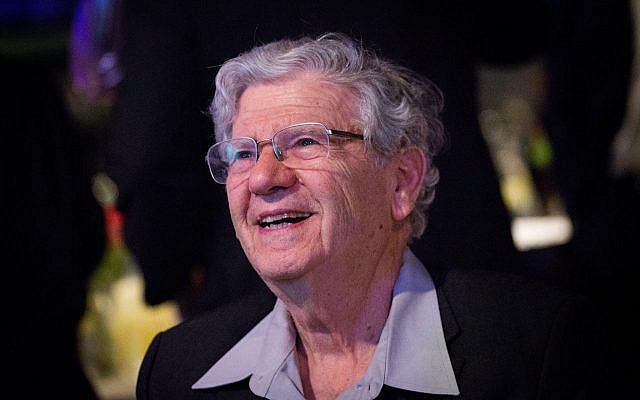Former Supreme Court president Barak: I’d quit if they passed the ‘override’ law
Justices can’t protect Israel’s democracy if they don’t have the tools, warns ex-court head, castigating Netanyahu for planning ‘dramatic change’ to avoid prosecution for graft
The best-known and most controversial former chief justice of Israel’s Supreme Court said he would likely resign if, while he was in office, the Knesset passed the kind of far-reaching constitutional reform that Prime Minister Benjamin Netanyahu and his intended new coalition partners are reportedly planning, which would remove the court’s authority to override laws and decisions justices deem unconstitutional.
“I would consider resigning” if the “override clause” curbing the court’s authority became law, said Prof. Aharon Barak, in an interview with Channel 13 news. “Why not? What would I be doing there? What would I be able to do there?”
Barak, 82, who headed the Supreme Court from 1995 to 2006, and who is most closely identified with the court’s ostensibly activist nature, was reacting to widespread reports that the incoming Netanyahu coalition will indeed legislate to curb the powers of the court — giving Knesset members the authority to re-legislate laws that the court has struck down, and preventing the court from intervening in administrative decisions.
Provisions for a particularly wide-ranging version of the so-called override legislation will be included in the coalition agreements, Channel 12 news said Wednesday night.
Such a law is of immense potential personal significance for Netanyahu, who is facing prosecution in three corruption cases, and is widely expected to ask his fellow Knesset members to vote in favor of giving immunity from prosecution, as is possible under existing Israeli law. In the current balance between the legislature and the judiciary, however, the Supreme Court would likely overturn such a Knesset decision. The legislation mooted by the incoming government would deny the court the right to do so, meaning that Netanyahu could not be prosecuted.
The court’s obligation to maintain oversight over the legislative and executive branches is enshrined in Israel’s quasi-constitutional Basic Laws, approved by the Knesset, as a central feature of the checks and balances of Israeli democracy.

This would be “a dramatic change” that would deeply harm individual rights in Israel, Barak said. The “override clause” would mean that “disproportionate harm” could be done to the individual by the governing majority, with no legal recourse. It was the court’s obligation to prevent such harm being done, he said. And it would be wrong for the court to be stripped of the capacity to prevent such harm simply because Netanyahu was facing his own “dramatic change,” said Barak, referring to the prime minister’s legal difficulties.
If he was still in office and such a change was legislated, “I would consider resigning. Why not?,” he said.
After all, Barak elaborated, “The key task of the Supreme Court is to protect the democracy, to protect the constitution. It can’t protect the democracy and can’t protect the constitution if it doesn’t have the tools to do so.”
According to Wednesday’s Channel 12 report on the planned reform, among the legislation’s core elements is that the Knesset will be able to re-legislate any law that the Supreme Court has struck down as unconstitutional, and do so with a majority of 61 votes in the 120-member Knesset. The court has struck down some 18 laws in the past two decades, which defenders of the court say is an extremely low number by western standards.
The bill will also remove the court’s authority to overturn parliament’s administrative decisions, the TV report said, including decisions to grant Netanyahu or any other Knesset immunity from prosecution. Netanyahu is to be indicted for fraud and breach of trust in all three cases, and bribery in one of them, pending a hearing scheduled for October. If the planned legislation becomes law before then, Netanyahu would be able to avoid being indicted.

Legal commentators have warned in recent weeks that the proposed Supreme Court “override clause” constitutes the most dramatic constitutional change in Israeli history, shattering the balance between the legislature and the judiciary. In an interview with The Times of Israel last week, Prof. Mordechai Kremnitzer, a leading Israeli criminal and constitutional law expert, warned that “it would be wrong to describe a country as democratic with a law like this.”
In a Facebook post last week, Netanyahu wrote that he has always supported “a strong and independent court — but that does not mean an all-powerful court.”
Last week, Likud said the coalition agreements would not include provisions for legislation to change Israel’s existing immunity laws, and reports in recent days have indicated that Netanyahu believes he will be able to secure immunity from prosecution under the existing legislation, and has thus shifted his focus to legislation that would prevent Supreme Court intervention on the immunity issue.

Likud MK Miki Zohar, who chairs the Knesset House Committee that handles immunity issues, boasted on Monday that the Supreme Court would soon be “irrelevant.” Arguing with an MK from the left-wing Meretz party during a committee meeting, Zohar said: “MK Michal Rozin, imagine: The ‘override clause’ passes, so you can no longer go to the High Court. The immunity law passes, and you’re stuck with Bibi [Netanyahu] for another 10 years. What will you do? What will you do?… Oh my God. I think this could shape up as one of the most difficult [Knesset] terms ever for you. The High Court no longer relevant, Bibi here for another 10 years. Oh my God.”
Israel’s main opposition Blue and White party is organizing a demonstration in Tel Aviv on Saturday to protest the prime minister’s efforts to evade prosecution via new legislation, and the planned curbing of the Supreme Court’s authority.


comments